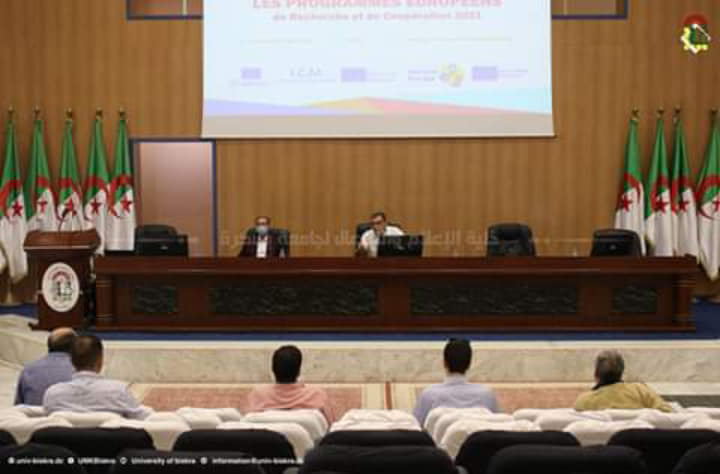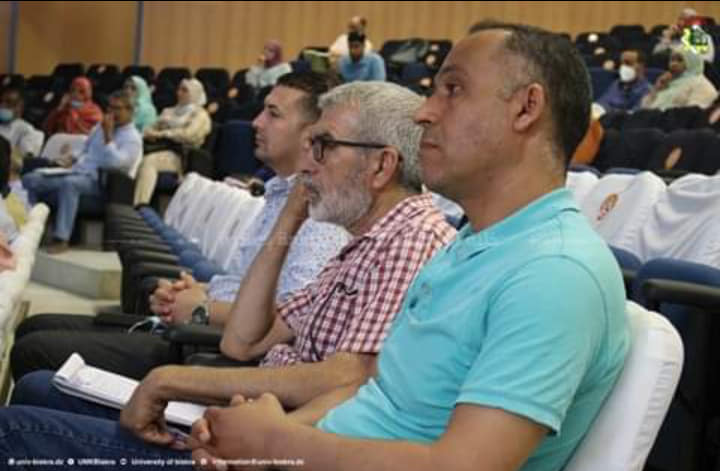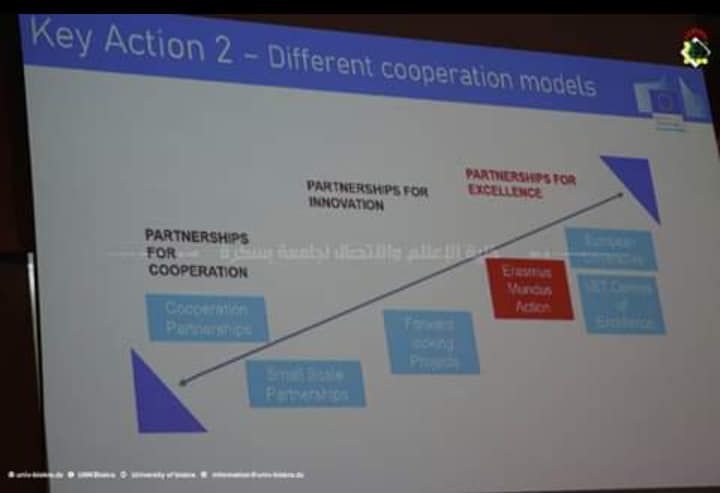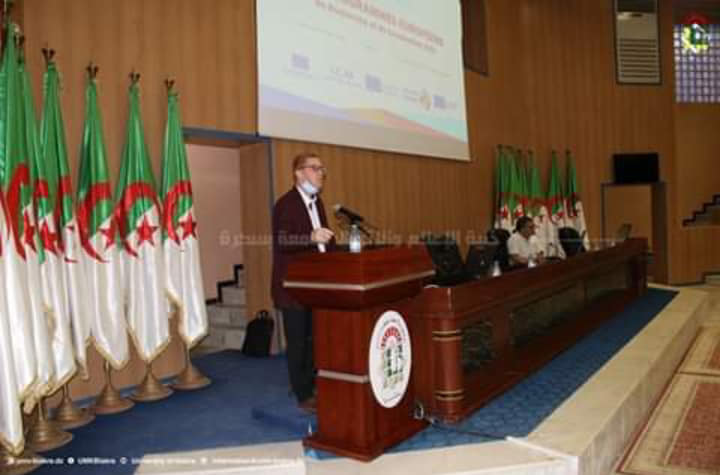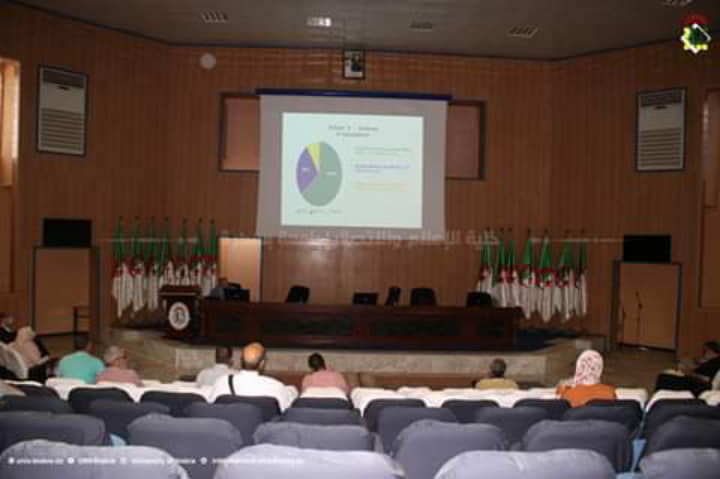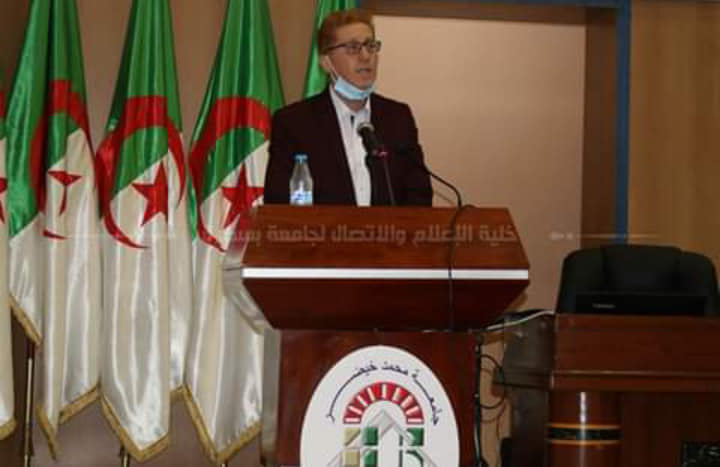


(JSSIM 2022) 15 et 16 Juin 2022 - Université de Batna



(JSSIM 2022) 15 et 16 Juin 2022 - Université de Batna
Le projet DIGITAQ est en plein développement et lance son appel pour la sélection de l’évaluateur externe.
Le contrôle de la qualité est une partie intégrante du projet, de façon à assurer que les buts et les activités soient atteints efficacement.
L’expert externe évaluera les progrès et la réussite des activités par rapport aux indicateurs du projet et proposera des actions visant à améliorer l’efficacité globale des résultats.
Pour les termes de référence et de plus amples informations, veuillez cliquer ici.
On Monday, October 4, 2021, the University of Biskra participated in the events of the meeting that brought together the committees responsible for the DIGITAQ project. This was done through remote conferencing technology under the supervision of the project committee's chairman at the University of Biskra, Professor Mabrouk Bahri, along with professors from the university.
The event also included participation from other universities in the country, such as Umm El Bouaghi, Ouargla, Setif 2, Mascara, Khenchela, Algiers 1, and the University of Oran for Science and Technology as the coordinating member. Additionally, representatives from European universities participated. The scientific meeting focused on publishing and communication within the DIGITAQ project, as well as communication strategies. The discussions were enriched by the participants' interventions regarding the action plan related to project publishing and communication, with some suggestions being presented.
It is worth noting that this international project is part of the "Erasmus+ KA02" program aimed at establishing digital capabilities to ensure quality in higher education. It also aims to strengthen the capabilities of universities in digitizing quality in areas such as management, training, research, student life, governance, structures, and relationships with the socio-economic sector. The University of Biskra officially joined the project on March 2, 2021, in Oran, represented by its director, Professor Ahmed Boutarfaya, and the quality assurance cell coordinator at the University of Biskra, Professor Mubarak Bahri.






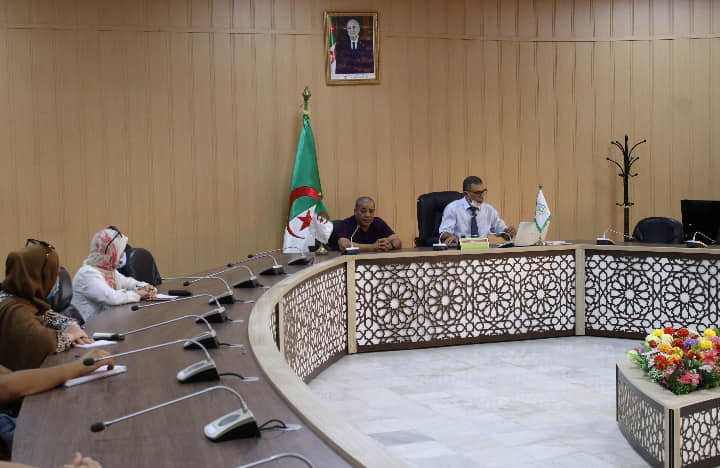 In accordance with the new ministerial directives calling for the establishment of specialized teams to ensure quality at the level of colleges, the inauguration ceremony of the Quality Assurance Cell took place on Tuesday, September 21, 2021, in the meeting hall at the directorate. The event was supervised by the University Director, Professor Ahmed Boutarfaia, and attended by the cell's president, its members, and staff. It's worth noting that the quality assurance team at the college level includes employees and professors who have been endorsed by the deans of the colleges.
In accordance with the new ministerial directives calling for the establishment of specialized teams to ensure quality at the level of colleges, the inauguration ceremony of the Quality Assurance Cell took place on Tuesday, September 21, 2021, in the meeting hall at the directorate. The event was supervised by the University Director, Professor Ahmed Boutarfaia, and attended by the cell's president, its members, and staff. It's worth noting that the quality assurance team at the college level includes employees and professors who have been endorsed by the deans of the colleges.
The meeting was chaired by the president of the Quality Assurance Cell, Professor Mubarak Bahri, who aimed to define the tasks assigned to the members of this cell and discuss the established work procedures.
At the beginning of the session, the university director delivered a speech in which he acknowledged the efforts made over the past years, welcomed the new members of the cell, and emphasized the importance of working together to identify both positive and negative aspects. He highlighted the goal of enhancing the institution's program, developing the quality of education and student life, and improving professional environments and external relations. The director mentioned the University of Biskra's participation in the DIGITAQ project, which aims to strengthen universities' capacities in digitizing quality in various areas.
The president of the cell began his intervention by providing an overview of the initial texts that laid the foundation for the quality assurance cells in 2006. These cells aimed to improve the level of university institutions in all aspects through seven fields divided into assessable categories. He emphasized the shift from an emotional evaluation system to an objective evaluation system based on agreed-upon criteria. Professor Mubarak Bahri provided clarifications to those responsible for quality at the college level regarding their work methods and activation, presenting principles and examples to facilitate the understanding of concepts in a straightforward and flexible manner. He stressed the seriousness and discipline required for these tasks to enhance the cell's role, urging the definition of members' roles and understanding the required responsibilities. He also emphasized the need to prepare a job description card to specify and limit each official's duties and responsibilities, allowing for accurate evaluation of the entire university based on quality system principles.
In their interventions, the cell members addressed various points related to the overall work program and highlighted their assigned tasks at the college level. They also presented suggestions regarding the activities of these offices and called for organizing training workshops for members of the Quality Assurance Cell to enhance their performance.
In conclusion, the president of the cell considered the mission of these teams exceptional, aiming to provide clear guidance for competencies to improve management and achieve better results. He called for a conscious and intelligent approach to managing the cell's activities, reinforcing its role in the advancement and elevation of the university's level. He mentioned the scheduling of future meetings to present the cell's program and develop an action plan for the year in the near future.
The Deputy Director of the University for External Relations, Communication, Cooperation, and Scientific Events, Professor Mahmoud Dabboush, held a meeting with the professors of the University of Biskra on the morning of Sunday, May 23, 2021, in the main lecture hall. The purpose of the meeting was to introduce European cooperation programs, and it was attended by deputy directors and deans.
In his opening remarks, the Deputy Director addressed several points. He began by providing an overview of the important European research and cooperation programs available for the current year. He explained the participation mechanisms and how to engage in them. He also discussed partnership and cooperation agreements between the University of Biskra and prominent European universities, highlighting the university's achievements in this regard.
Furthermore, he presented the key stages in the evolution of the ERASMUS+ program and the new projects it includes. He explained the essential levels within the program for the period 2021-2027. He also pointed out European research projects in which the University of Biskra is involved, such as ICMED, AFREQEN, ARIMNET, PRIMA, DIGITAQ, ELAN, and others. Additionally, he provided digital indicators regarding the participation of professors from the University of Biskra in various projects from 2015 to 2020.
Mr. Mubarak Bahri, the head of the Quality Assurance Cell, emphasized the role of the researching professor in energizing and enhancing the effectiveness of higher education institutions through the utilization of European cooperation programs. He encouraged setting and defining goals for participation and gaining a comprehensive understanding of the objectives within the framework of continuous coordination with research laboratories. He invited researching professors to follow and monitor everything related to European cooperation policies in scientific research. Professor Belkacem Boumaaraf also delivered a lecture on European HORIZON projects, and Mr. Momi Mohamed gave another lecture on ERASMUS+ research projects
